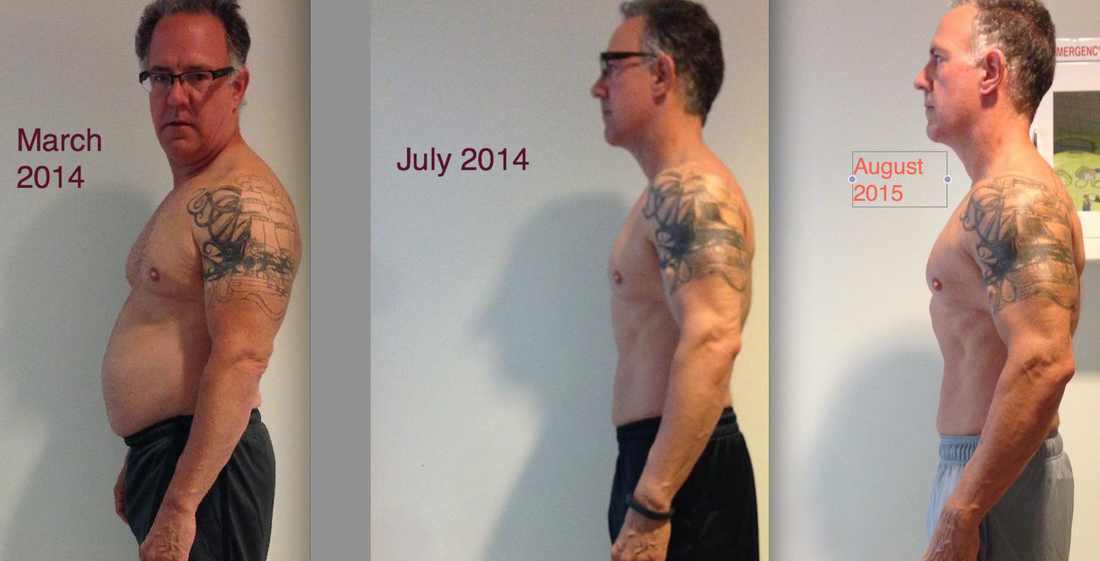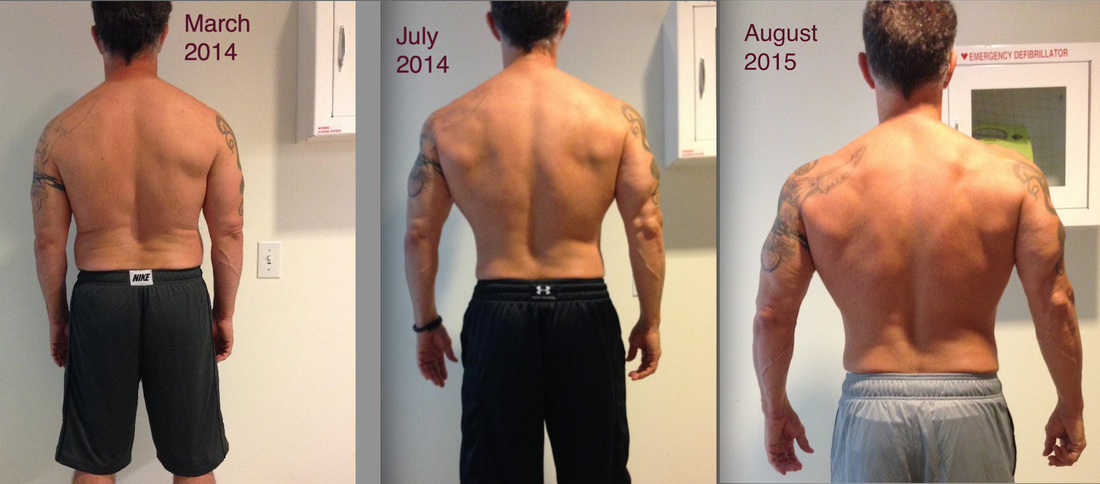Wow! It’s been almost 20 months since I started this journey. Armed with the Get Fit, Lean and Keep Your Day Job program, I dropped nearly 35 pounds and successfully transformed myself from a fat, exhausted, 49-year-old middle-aged guy into a fit, energetic, 51-year-old powerhouse. I feel better than I have ever felt in my life – and so can you! Recently I was introduced to the concept of the ketogenic diet and ketone supplementation. My own experience with it has been amazing – this is a game-changer. Let’s talk a little about the science behind ketones – what they are and how they improve health and physical performance, and how you can utilize a new supplement to achieve ketosis.
Ketogenic nutrition
An exciting trend in nutrition right now is the ketogenic diet. It’s actually been around for a long time, and maybe you’ve heard of it. If not, here’s a great resource from Joseph Arcita, [http://josepharcita.blogspot.com/2011/03/guide-to-ketosis.html ] and here’s my "Cliff’s Notes" version of what ketones are and what they can do.
What are Ketones and Why Should I Care?
Ketones are a by-product of fat metabolism. Your body can fuel itself on glucose (which comes from eating sugars, fruit, and processed carbs like flour and starches), but when your body buns off all that glucose, it will switch fuel sources and will start to convert fat into fatty acids and then ketones. Ketones are then used as fuel – and they are a potent fuel, providing 38% more energy than glucose does. So think of ketones as a more potent rocket fuel for your body and brain. Our bodies were designed to do this because back in the days of our caveman ancestors, food supplies were not constant and were often seasonal. In times of spring and summer there’d be plenty of food. Our ancestors would have plenty to eat and would pack on a little extra bodyfat, and then in the winter, when food was scarce, our bodies would live off that extra stored bodyfat. That’s how our bodies evolved to work. But we’re not cavemen anymore, and we have plenty of food year round, and so a huge percentage of the population just keeps packing on the bodyfat year round! So let’s try to tap into that biologic efficiency your body was designed to support: let’s get our body to use fat, and therefore ketones, for fuel!
Your Body’s Fuel Sources: Glucose vs Ketones
Your body is basically like a hybrid car. It uses two sources of fuel: glucose and ketones. Glucose is like gasoline – it burns very quickly and so your body has to keep finding sources of it to turn into fuel. The thing is, too much glucose in our system also triggers the insulin response which tells our body to store calories as bodyfat. Ketones, on the other hand, burn strong, slow and steady like charcoal in your weber grill and provide a more stable fuel source. Ketones are also preferred by your brain, and there’s a ton of research showing that your brain runs better on ketones than it does on glucose. So ketones help your brain function at peak efficiency and don’t trigger an insulin response and instead help your body use its own bodyfat as fuel. Sounds pretty good, doesn’t it?
So how do you get your body to switch over to ketones as fuel? Well, in order to do that you have to get your body in a state of ketosis, which means it is utilizing ketones for fuel (normally this is achieved by ketogenesis, which is the process by which your body when starved of glucose as a potential fuel, breaks down your own body fat into fatty acids and those are converted to one of three ketones by your liver). The problem with the typical Western style diet is it’s so high in starches, sugars, and other carbohydrates, which readily convert to blood glucose. That means there is rarely an opportunity to get our bodies into a state of ketosis or ketogenesis. So you have two ways you can get into ketosis: You can starve yourself all winter like our caveman ancestors (mmmm, doesn’t sound like fun) or you can try to follow what’s called a Ketogenic Diet (not easy, but I'll explain it below).
The Ketogenic Diet
A state of ketogenesis and therefore ketosis can be achieved by removing almost all carbohydrates from your diet. When faced with a lack of glucose (which comes from eating processed carbs, simple carbs and sugars) your body will turn to ketones for fuel. Kind of like switching your hybrid car from gasoline to electric. To do this requires extreme carbohydrate restriction – most ketogenic diets consist of 5-10% or less carbs – moderate protein (20-25%) to avoid your body converting excess protein into glucose – and the rest (65-75%) fats. This is NOT an easy nutritional plan to adhere to for most people (which is one of the knocks against the ketogenic diet) but doing so will typically put your body into a state of ketogenesis and ketosis – meaning you are using fat and ketones for fuel, rather than glucose. And of course, some of that fuel comes from your own bodyfat stores. Which, if you’re trying to drop some excess baggage off your body, sounds pretty ideal.
In addition to getting your body to start using its own bodyfat as fuel, being in ketosis also has a host of benefits to the brain and body.
Benefits of Ketosis on the Brain
The ketogenic diet has been used since the early 1900s to help control epileptic seizures in epilepsy patients (http://www.charliefoundation.org) and recent studies have shown it improves memory and cognitive function in dementia and Alzheimer’s patients (http://www.ncbi.nlm.nih.gov/pubmed/15123336).
It has also been shown to have a neuroprotective effect in cases of traumatic brain injury and PTSD, and has been shown to improve symptoms and enhance skills and cognition in autistic patients. Studies are being done that suggest these benefits can be extended to ALS, Parkinson’s and other cognitive disorders like ADD and ADHD, and even shows potential in depression, bipolar disorders and schizophrenia.
If you’re still skeptical (I was until I did exhaustive research on ketones and the ketogenic diet), here’s a great article from Psychology Today on the effects of ketones on the brain:
[ https://www.psychologytoday.com/blog/evolutionary-psychiatry/201104/your-brain-ketones ]
Benefits of Ketosis on the Body
The list of physical benefits are impressive. The ketogenic diet causes weight and fat loss, and more importantly, it has been shown to improve diabetic symptoms, and helps improve insulin sensitivity and efficacy in the body. The ketone beta-hydroxybutyrate has also been shown to inhibit inflammasome activity and thus providing an anti-inflammatory effect (anecdotal reports show individuals have gotten relief from rheumatoid arthritis, polycystic ovary disease, migraine headaches, eczema, and other conditions caused by inflammatory processes. Here’s an article that sums up a lot of these concepts:
http://www.dailymail.co.uk/health/article-2238842/Could-elixir-hold-key-weight-loss-Experts-hope-itll-treat-diabetes-epilepsy-Alzheimers.html
Ketones as an Energy Source
Most people who achieve ketosis report feeling super-human like energy levels and a high level of mental cognition and focus. Ketones actually provide 38% more adenosine triphosphate (ATP – your mitochondria’s energy source) than glucose. So the energy benefit when using ketones for fuel is significant.
Ketones and Athletic Performance
Let’s talk about the use of ketones by athletes. Several studies on endurance athletes have shown that they are able to perform at a higher level for a longer period of time when in ketosis. Many of last year’s Tour de France riders supplemented with a new ketone-based product and experienced great results. (http://www.cyclingweekly.co.uk/news/latest-news/ketones-controversial-new-energy-drink-next-big-thing-cycling-151877)
http://www.palmares.co.uk/project/ketones/
http://www.eurekalert.org/pub_releases/2015-11/osu-eaw111615.php
In addition, a study on elite rowers showed that ketone supplementation improved performance, and several of the subjects attained personal bests.
Ketone Supplements
So I just described how good ketones are for you, but also how difficult it is to achieve ketosis through nutritional adjustments. Most people simply cannot adhere to such a strict diet. And ketosis is a delicate state – once your body is in ketosis, it doesn’t take much to knock it out of ketosis. If you slip up and eat something with a bunch of carbs, you can knock yourself out of ketosis and it can take days to get back to it.
So, what if there was something you could just drink, that would put you in ketosis in an hour? Well there is, and they’re called Ketone Supplements (do not confuse them with "raspberry ketones" which is not a viable supplement).
The Origin of Ketone Supplementation
The Dept of Defense actually commissioned researchers to create a ketone supplement that would minimize seizures that occur in Navy divers who are using high-oxygen rebreathers (breathing oxygen at depth can cause seizures). [ http://www.seapowermagazine.org/stories/20151208-divers.html ] Interestingly, the side effects reported by the subjects included higher energy levels, mental clarity, and focus.
http://www.bengreenfieldfitness.com/2013/10/deep-dive-ketosis-navy-seals-extreme-athletes-busy-executives-can-enhance-physical-mental-performance-secret-weapon-ketone-fuel/
The researchers knew they were onto something. Synthesizing ketones into a supplement that humans can stomach was difficult and expensive. For a long time the only people who had access to ketone supplements were the military, researchers, and elite athletes who had a connection to someone who could provide them. And to be honest, they tasted horrible and a lot of people couldn’t stomach them.
So how does a regular human like you and me get ahold of something like this? Well earlier this year the first publicly available ketone supplement came to market: Keto//OS: The Ketone Operating System. It’s a powdered mix that you add to water and drink – it tastes great and puts you in ketosis in less than an hour. In the interest of full disclosure, I have been involved with PruvIt, the company that created and distributes Keto//OS, since May and I'm a distributor of the product. My own experience has been life-changing. I’m a complete convert to the ketogenic lifestyle as well as ketone supplementation, and I’d encourage people to give it a try. The thing is, following a ketogenic diet can be extremetly challenging. As I said before, most people don’t want or don’t have the discipline to eat 65-75% fats and keep their carbs under 10% of their intake in order to achieve nutritional ketosis. And one misstep can throw you out of ketosis for days or even weeks. That’s where the supplement comes in. You can get your body into a state of ketosis within an hour and stay in a heightened state of ketosis for hours by using the supplement. If you want more info about it, go to http://stevewelch.pruvitnow.com/research and watch some of the videos and read the blogs and research info. It’s worth investigating. I’m not telling you about this because I’m trying to sell you something. I’m telling you about it because it has flat-out worked for me. I love how I feel when my body is running on ketones. And it’s supercharged my workouts and my life overall. I’ve been crushing it at the gym, at work, and everywhere.
I don’t want to use this blog to plug products – but when something this unique comes along that actually does what it claims it’ll do, I feel obligated to tell people about it. All I can say is, give it a try and see for yourself. Because the truth is, you don’t have to take a supplement to experience ketosis – but it’s a lot easier than trying to adhere to a strict ketogenic diet. I’m interested in hearing what you think.
Yours in health,
Steve
About the author: Steve Welch is a medical publishing professional who got fit, lean and kept his day job. If a 51-year-old desk jockey like me can do it, so can you. So let's do this! - and YES the photos below are of me.



 RSS Feed
RSS Feed